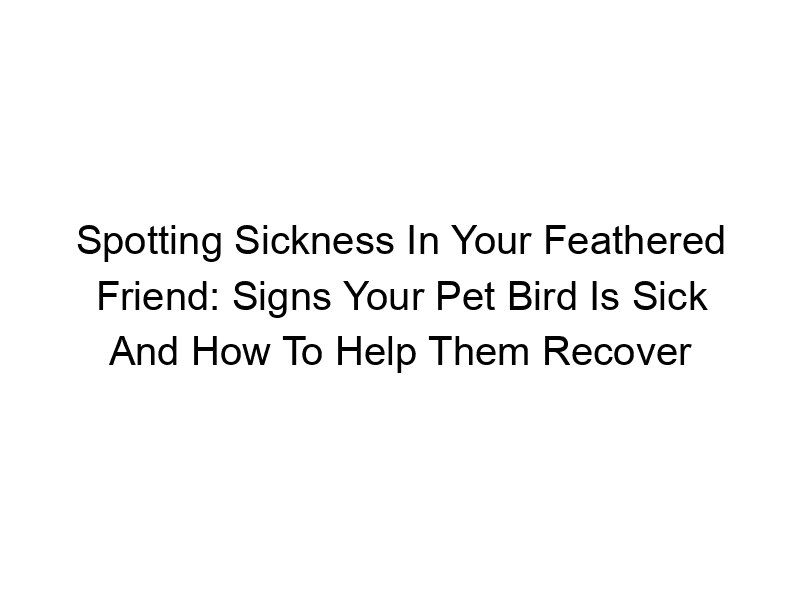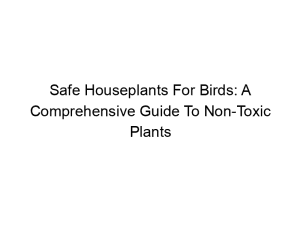Your pet bird is more than just a pet; it’s a cherished member of your family. Their vibrant chirps and playful antics bring joy to your home. But recognizing when something is amiss can be challenging. This comprehensive guide will equip you with the knowledge to identify signs your pet bird is sick and provide effective strategies for helping them recover. We’ll cover a range of symptoms, underlying causes, and crucial steps for ensuring your feathered friend receives the best possible care. You’ll learn about recognizing subtle behavioral changes, understanding avian illnesses, and knowing when professional veterinary intervention is essential.
Birds possess a unique physiological makeup compared to mammals. Their respiratory system, digestive tract, and skeletal structure are distinctly different, influencing how diseases
manifest and how they respond to treatment. Understanding these differences is key to recognizing illness.
Common Avian Illnesses
Avian illnesses range from minor infections to life-threatening conditions. These include respiratory diseases (such as avian influenza and psittacosis), bacterial and fungal infections, parasitic infestations, nutritional deficiencies, and various other health problems. Early detection is vital for successful treatment.
Recognizing Behavioral Changes: A Key Indicator of Illness
Changes in Activity Levels
A sudden decrease in energy levels, lethargy, or unusual stillness can indicate underlying health issues. A normally active bird becoming listless is a significant warning sign. Observe their usual behavior to identify deviations.
Changes in Vocalizations
Changes in your bird’s chirping, singing, or calls should be heeded carefully. A sudden absence of vocalizations, unusual squawks, or wheezing sounds can point to respiratory problems or discomfort.
Changes in Appetite and Water Intake
Significant changes in eating habits, such as refusing food or water, are serious indicators of illness. Monitor your bird’s food and water consumption daily to identify any abnormalities.
Physical Signs of Illness in Pet Birds
Feather Appearance and Condition
Ruffled feathers, dull plumage, or excessive feather plucking can suggest stress, illness, or nutritional deficiencies. Regularly examine your bird’s feathers for changes in texture, color, and overall condition.
Respiratory Issues
Wheezing, gasping for air, or open-mouthed breathing are clear signs of respiratory distress. These can be symptoms of various infections, allergies, or other underlying health problems.
Digestive Problems
Diarrhea, regurgitation, or changes in droppings can indicate digestive issues. Observe the consistency, color, and frequency of your bird’s droppings to identify any abnormalities.
Eye and Beak Examinations: Detecting Subtle Signs
Eye Discharge
Discharge from the eyes, whether watery or thick and crusty, may signal an infection or irritation. Check your bird’s eyes daily for clarity and absence of discharge.
Beak and Nail Condition
Examine your bird’s beak and nails for abnormalities such as overgrown nails, cracks in the beak, or changes in color. These can be indicative of various health problems.
Common Avian Illnesses and Their Symptoms
Avian Influenza (Bird Flu)
Characterized by respiratory symptoms, including sneezing, coughing, and difficulty breathing. It can also cause lethargy, loss of appetite, and diarrhea. Immediate veterinary attention is critical.
Psittacosis (Parrot Fever)
A bacterial infection that can affect various bird species. Symptoms include respiratory problems, lethargy, diarrhea, and weight loss. It’s zoonotic, meaning it can be transmitted to humans.
Bacterial and Fungal Infections
These infections can manifest in various ways, depending on the specific pathogen. Symptoms can range from respiratory problems and skin lesions to internal organ damage.
Nutritional Deficiencies: A Hidden Threat
Importance of a Balanced Diet
Providing a balanced diet rich in essential nutrients is crucial for maintaining your bird’s health. Nutritional deficiencies can weaken their immune system, making them more susceptible to illnesses.
Recognizing Signs of Nutritional Deficiencies
Symptoms of nutritional deficiencies can include dull plumage, feather picking, weight loss, weakness, and impaired bone development. Consult an avian veterinarian for guidance on proper nutrition.
Parasites: Internal and External Threats
Identifying and Treating Parasites
Internal and external parasites can severely impact your bird’s health. Signs include weight loss, diarrhea, lethargy, and feather damage. Veterinary treatment is essential to eliminate parasites.
When to Seek Veterinary Care
Recognizing Emergency Situations
Certain symptoms warrant immediate veterinary attention. These include difficulty breathing, severe lethargy, profuse diarrhea, significant weight loss, and any signs of trauma.
Finding an Avian Veterinarian
Locate an avian veterinarian in your area who is experienced in treating birds. Avian veterinarians have specialized knowledge and equipment to provide appropriate care.
Providing Supportive Care at Home
Creating a Comfortable Environment
Maintain a clean, comfortable, and stress-free environment for your bird. This includes providing a clean cage, fresh food and water, and minimizing noise and disturbances.
Administering Medications
If prescribed medication by a veterinarian, carefully follow their instructions for administering the medication. Some medications can be added to food or water, while others require direct administration.
Prevention is Key: Maintaining Your Bird’s Health
Regular Veterinary Checkups
Regular veterinary checkups are essential for early detection of potential health problems. Annual exams allow for preventative measures and early treatment if needed.
Quarantine New Birds
When introducing a new bird to your existing flock, quarantine it for a period of time to prevent the spread of disease.
Understanding Avian Health Terminology
Defining Key Terms
Understanding common avian health terms will empower you to communicate effectively with veterinarians and to research information effectively. Learn the meanings of terms like aspergillosis, avian pox, and coccidiosis.
Frequently Asked Questions
What are the most common signs of illness in pet birds?
Common signs include lethargy, changes in appetite and water intake, ruffled feathers, respiratory distress (wheezing, gasping), diarrhea, and changes in vocalizations.
How often should I take my bird to the vet for a checkup?
Annual checkups are recommended, but more frequent visits may be necessary depending on your bird’s age, breed, and health status.
What should I do if my bird is exhibiting signs of illness?
Observe the symptoms carefully, note the severity and duration, and contact an avian veterinarian as soon as possible.
Can human medications be given to birds?
No, never administer human medications to your bird without consulting a veterinarian. Many human medications are toxic to birds.
How can I prevent my bird from getting sick?
Maintain a clean environment, provide a balanced diet, ensure proper hygiene, and follow a regular veterinary checkup schedule.
What is the best way to transport a sick bird to the vet?
Use a secure carrier that provides warmth and protection. Avoid exposing your bird to extreme temperatures or stress during transport.
Final Thoughts
Recognizing signs your pet bird is sick requires attentive observation and understanding of their normal behavior. While this guide provides valuable information, it’s crucial to remember that professional veterinary care is paramount in diagnosing and treating avian illnesses. Early intervention significantly increases the chances of a successful recovery. By remaining vigilant and proactive, you can ensure your feathered companion enjoys a long, healthy, and happy life. Don’t hesitate to seek professional help if you have any concerns about your bird’s health. Early detection and treatment are key to a positive outcome. Remember, your bird’s well-being depends on your awareness and prompt action.




